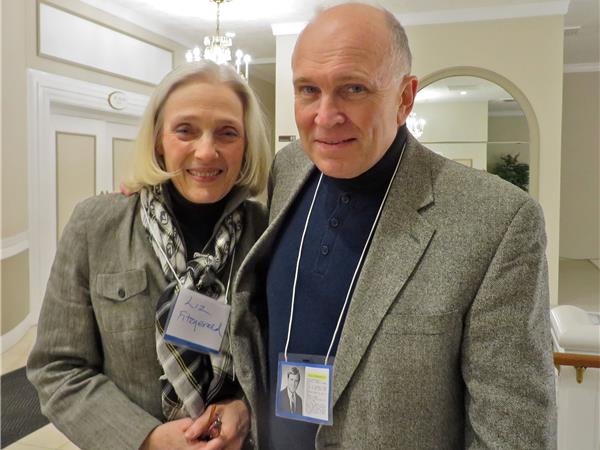Five Part Series: 15th anniversary of 9/11, 2016
By Paul Fitzgerald and Elizabeth Gould
The forces vying to determine the direction of the American Empire in the 21st century began their struggle long before 9/11. It might be said that the December 1979 Soviet invasion of Afghanistan was the signature event that made 9/11 inevitable. The Soviet reaction to infiltration and destabilization on their southern border ended de'tente and renewed the Cold War but also kicked off a U.S. backed Islamist expansion into Central Asia that has now spread like a plague into Europe and the Middle East and today threatens to ignite World War III. At the time the Soviet invasion was presented as an open act of aggression and declared by President Jimmy Carter to be the most serious threat to peace since World War II. It would establish a new narrative of uncompromising hostility toward the Soviet Union and erase decades of efforts by moderates inside both Soviet and American systems to end the Cold War. It would increase defense spending to World War II size levels thereby changing the United States from a creditor to a debtor nation and would also embed the so called New Right and their neoconservative allies with their aggressive, militarist agenda into the American political establishment.
The engine that drives today's ideological and economic warfare against Russia and the crisis the United States suffers from in both its domestic and foreign agendas, both politically and economically stems from an extended psychological warfare campaign cooked up against the Soviets during the Cold War but prolonged and intensified during their long war in Afghanistan.
Following the events of December 27, 1979 Americans responded dutifully to a prepared script as it poured from a hoard of foreign policy "experts" bemoaning America's military weakness while claiming Afghanistan was payback for Vietnam. Zbigniew Brzezinski himself claimed in his memoirs that the Soviet's move into Afghanistan was a vindication of his concern "that the Soviets would be emboldened by our lack of response over Ethiopia." The shaken president, Jimmy Carter announced a U.S. boycott of the 1980 Moscow Olympics, the creation of a rapid deployment force to the Middle East and a new get tough posture toward the Soviet Union.
On January 2, 1980 the MacNeil Lehrer News Hour brought in former U.S. Ambassador to Afghanistan Theodore Eliot and Harvard Professor Richard Pipes to speculate on the implications of the invasion. As an unabashed neoconservative ideologue, Pipes should have been considered a controversial choice sitting alongside the thoroughly mainstream Eastern establishment Eliot. But on this evening Pipes had been chosen to play the very special role of delegitimizing de'tente with the Soviet Union while moving the discussion permanently and irretrievably to the neoconservative right wing. Paired with Eliot, the dean of American diplomacy and soon to be Secretary General for the United States of the Bilderberg group, the message was made clear that the ideology of neoconservatism, globalism and the institutions of the American government were now one and the same.
It was a moment that would change the United States in ways that few Americans would immediately understand and many continue to find baffling. Years earlier, Pipes had been chosen to chair a biased, highly partisan study of the CIA known as the Team B experiment in competitive analysis.
The decade of the 1970s presented a series of strategic shocks to the United States. The Watergate scandal and the Arab oil embargo, campus protests, combined with the American military failure in Vietnam opened the door for de'tente with the Soviet Union. Vietnam removed the veil from America's Cold War defense-intellectual elite, revealing their complex mathematical formulas for war to be useless as a guide to action. But even before the end of that war in 1975, pressure had been building from an influential collection of neoconservative hawks assembled by Albert Wohlstetter to ignore the facts on the ground, blame de'tente for American weakness and wind back the clock to an openly militarized Cold War approach to the Soviet Union.
Backed by Gerald Ford's CIA director George H.W. Bush, the President's Foreign Intelligence Advisory Board (PFIAB) vice chairman, Leo Cherne, and the father of Cold War thinking, Paul Nitze, Team B's goal was to turn the CIA's thinking about the Soviet Union on its head.
"The intensity and scope of the current Soviet military effort in peacetime is without parallel in twentieth century history," they claimed in their top secret 1976 report. The Soviets were preparing for a "third world war" and were comparable only to "Nazi remilitarization of the 1930s." Given military superiority and the will to use it, they reasoned, at some point in the near future the Soviets would make a strategic move that the United States would be militarily unable to stop.
But it was in their claim that the Soviets would first "intimidate smaller powers . . . adjacent to the USSR . . . where pro-Soviet forces have an opportunity to seize power but are unable to do so without military help," that the Team B assessment attained a level of prophecy.
(Note: You can view every article as one long page if you sign up as an Advocate Member, or higher).





